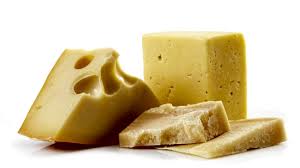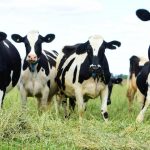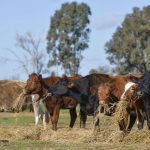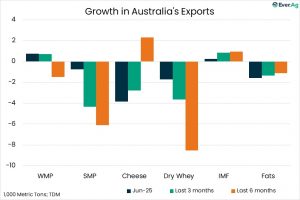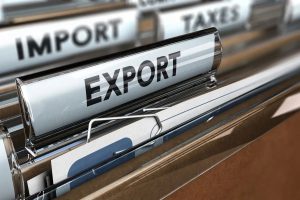
The landscape drops away like a cliff face.
Rocks and jagged edges make way for a sea of green leaves that cover mostly hidden rickety wooden vines that dissect the hills, almost as if in spite of the incline.
“For me it represents the tradition and also our dream,” Elena Moschetta says.
She’s standing at the window in her winery’s tasting room, overlooking the vineyard her grandfather started in Italy’s Treviso region decades ago.
It’s grown vastly in the years since.
When her father took over, he expanded the plantings to grow more prosecco grapes. Now, the third generation to run the family business, Elena and brother Enrico Moschetta have added a winery to their vineyard.
“It was our dream to produce prosecco,” she says.
Prosecco in this region represents more than just a bottle of sparkling wine. It’s a product that dates back to 1382, with the first mention of wine production in the region recorded during the Roman Empire.
“Prosecco was born here,” says William Spinazze, a third-generation vineyard owner.
“It’s a historical wine that was made, always, here.
“It’s very common on Sunday — after mass, after Papa — to stop in a bar and drink a prosecco before having lunch with the family.
“This way of living, you can’t drink heavy wine, so this is why prosecco broke into our culture, because it was the perfect way to enjoy your life.”
The threat other countries pose to Italian prosecco is laid bare in the approach its farmers and Government are demanding of the European Union as it pursues trade deals around the globe.
“Because it’s so popular, it’s easy to copy it [and] make it in different areas, [so] we need to protect it with all our forces,” Spinazze says.
“We know that some countries are producing prosecco as well, but it was born here and it’s the same as Champagne.”
“Prosecco is the name of a town, it’s in the north-east of Italy,” says Paolo De Castro, a man steeped in European agricultural politics.
A former Italian agriculture minister, he’s now the vice-president of the European Parliament’s agriculture and rural development committee.
“[Winemakers] are very much proud to use this name, so we very much would like to find a way to create a market for the real prosecco and to find a way to clarify to the Australian consumer when prosecco is made in a vineyard in Australia.”
In its effort to protect its brand, Italy sought to restrict the use of the word “prosecco”.
It changed the grape name from prosecco to glera in 2009 and then registered prosecco as a geographical indication (GI), in a bid to obtain the same level of protection that Champagne has.
Champagne is arguably the world’s most famous GI.
The system allows farmers and producers to protect names that are based off a location, provided they can prove its significance. There are various forms of GI. Some restrict the sourcing of raw products to a specific region.
For others, the production must happen within a set location, which in cases like beers and some processed meats, the GI is protecting the skill of local butchers or master brewers, rather than the ingredients they use.
In cases like prosecco, both the raw material and the stages of production must occur within the set zone.
“It’s a way in which a producer can escape the commodity trap,” says Francis Fay, the man responsible for overseeing Europe’s GI registers.
“There’s a lot of talk about globalisation and the impacts, particularly on the rural economy, in Europe at the moment and this is an instrument … that will prevent that price-depressing effect of commodity markets, where the producer is always running just to keep still as the price declines over time.”
Unapologetically seeking change in Australia
Irishman Phil Hogan is an imposing figure within the European Commission’s hallways.
Broad-shouldered and bespectacled, the 59-year-old towers above most he encounters.
For the past five years he’s been the commissioner in charge of agricultural and rural development policies, and is rumoured to be in contention to take on trade in the yet-to-be announced new-look commission following May’s European elections.
“We see the geographical indicator system as rural intellectual property,” he says.
“Depending on the culture and the area and tradition of where these products are produced, [it] gives a premium price and gives an added value for the producers of those products.”
Mr Hogan has played a high-ranking role in trade negotiations with Australia since the talks officially began in 2018. His involvement would only further escalate should he become Europe’s trade commissioner.
Australian Prime Minister Scott Morrison reportedly wants a deal reached this year, but it’s likely to take much longer to finalise. Market access, for both parties, is already strong. The EU is the largest foreign investor in Australia and two-way trade is already worth more than $100 billion.
“I cannot imagine why a country would not agree to recognise those origin denominators,” says Michele Geraci, Italy’s undersecretary of state for economic development.
“It gives consumers the certainty that the product does indeed come from that place.”
Though he expects Australia to give up the name, the Italian politician acknowledges the concern it could cause for prosecco producers on the other side of the planet, many of whom pride themselves on their Italian ancestry.
“I think in this case we will be looking at sunset clauses,” Geraci says.
“There would be a transition period where the local producer would have to adapt or adjust because we don’t want to go to another market to hurt anyone specifically.”
Australia fighting EU prosecco push
Australia and the EU have had a wine agreement for more than two decades, which is why prosecco is likely to be one of the only points of contention for winemakers in a broader free trade deal being inked.
That agreement is what protects the term “Champagne” from being applied to Australian wines.
Italy’s move to change the grape’s name infuriated the Australian wine industry, which has accused the Europeans of a “devious” attempt to “claw back” the prosecco brand.
After changing the grape name to glera in 2009, the European Commission wanted to register Prosecco as a GI in Australia in 2013, but the bid failed after Australia argued it had adopted the name because it was a generic variety name like chardonnay.
Exports of Australian-produced prosecco jumped 400 per cent in recent years, with domestic sales up 50 per cent. The volume of grapes crushed in Australia has increased 300 per cent since 2015.
But all of that is at risk, Australian prosecco producers argue, if a trade deal with Europe allows for prosecco protection in Australia.
The Australian wine industry is warning it will suffer an economic hit, and claims it will jeopardise up to $200 million in wine sales within four years.
They’re also keen to talk about the impact it would have on rural jobs, particularly in Victoria’s King Valley, which accounts for half of the nation’s prosecco production.
Italian farmers harvest the glera grapes that will later become prosecco. Supplied: Beatrice Pilotto
Europe says Australia didn’t want to talk about prosecco in the lead-up to its federal election in May. Some suspect that’s because the King Valley sits in the independent-held marginal electorate of Indi, which the Coalition had wanted to win.
Australia’s Trade Minister Simon Birmingham insists it’s too soon to predict Australian prosecco growers will have to give up the name.
“Yes, the European Union will ask for certain protections of geographical indications,” he says.
“We won’t be resolving any of those until the very end of the process once we have secured the best possible market-access conditions that we can.
“Even then, if we are to the point of contemplating any geographical indications to be protected as part of EU demands to get a deal overall, that will only be after we’ve consulted extensively with Australian industry and understood what the implications of any of those things would be.”
Cheeses could also be caught up in the GI debate
Besides prosecco, sources the ABC has spoken with list seven cheeses as those most likely to cause concern within Australia, should Europe want them protected.
The list includes feta, parmesan, haloumi, brie, camembert, pecorino, edam and cheddar. The mere mention of the latter will infuriate European trade negotiators, with “cheddar” not a protected term in Europe.
The GI protection is on the full name West Country Farmhouse Cheddar, and if the negotiations with Australia are like those with New Zealand, the EU will seek protections for the full name, not “cheddar”.
“I have been seeing in the Australian media some references to the fact that we wish to protect names such as chorizo, or ricotta, mozzarella, salami, chevre, names like that, which is wrong,” Hogan says.
“These are terms that aren’t even protected in Europe.”
Australia also has concerns with protections for the term “prosciutto”, but like with cheddar, the protections the EU has sought in New Zealand are for Prosciutto di Parma, Prosciutto di San Daniele and Prosciutto Toscana.
Sources expect Australian trade negotiators to accept EU protections for the full terms of Brie de Normandie, Edam Holland, Pecorino Romano and Camembert de Normandie.
The EU sent Australia a list of the products it wants GI protections for in a trade deal. But neither side is willing to publicly comment on the full list.
To stop a term getting protection, Europe will demand Australia prove it’s a generic term like milk or butter. Hogan’s expecting there will only be a “handful” of contentious GIs likely to cause a stir among negotiators — a sentiment Australian officials echo.
“There has to be evidence produced of the use of this particular name, over a long period of time in order to have it protected,” Hogan says.
“I think from an Australian producer’s point of view, they will have to produce this particular evidence in order that it doesn’t conflict with our Italian friends.”
Could Australia take inspiration from Spanish cava?
Few in Europe are willing to dub Australian prosecco producers victims in the trade negotiations. If anything, the farmers are conscious of the competition that’s at risk.
But they’re also quick to point to Spain, and a path many think Australian prosecco producers should take to rebrand their product.
“In Spain, traditionally any sparkling wine used to be called champagne,” says Ignacio Sanchez Recarte, the head of Europe’s peak wine representative body CEEV.
“Spanish sparkling wine producers had the opportunity to create an own image and they created the geographical indication domination for cava, which allowed them to have a specific image.
“Instead of being seen as producers who replicate a French product in Spain, they were able to transmit to the consumers … something which is their identity and they were able to create value for their own wines.”
European officials argue that without GIs, small, mountainous villages would struggle to survive. They say restricting production to certain areas has kept jobs and people in towns where they otherwise might have left.
“Nobody will be investing in those areas,” Sanchez Recarte says.
“They will be going to valleys, where it’s easier and production for the wine [is cheaper], which means the abandonment of traditional areas in the wine sector and the population of the European vineyards.”
Feta cheese facing an Australian rebrand
The mere suggestion of the term “Greek feta” is laughable for Nesseris Konstantinos.
“For us Greeks, it’s a joke,” he says.
Like Italians with prosecco, feta for Greeks is more than food.
“Our fathers, our grandfathers produced feta many, many years ago, in the most traditional way,” Konstantinos says.
“For us, feta is more than just a simple cheese. It reflects a way of life, it reflects a quality way of life.”
Konstantinos is the production manager for a major feta producer in the north-eastern Greek town of Ioannina.
Here, there’s what feels like constant mist in the air that keeps the grass lush, offering a year-round supply of feed for sheep and goats. As these animals graze, they do so among a thousand species and subspecies of plants that are endemic to the region.
